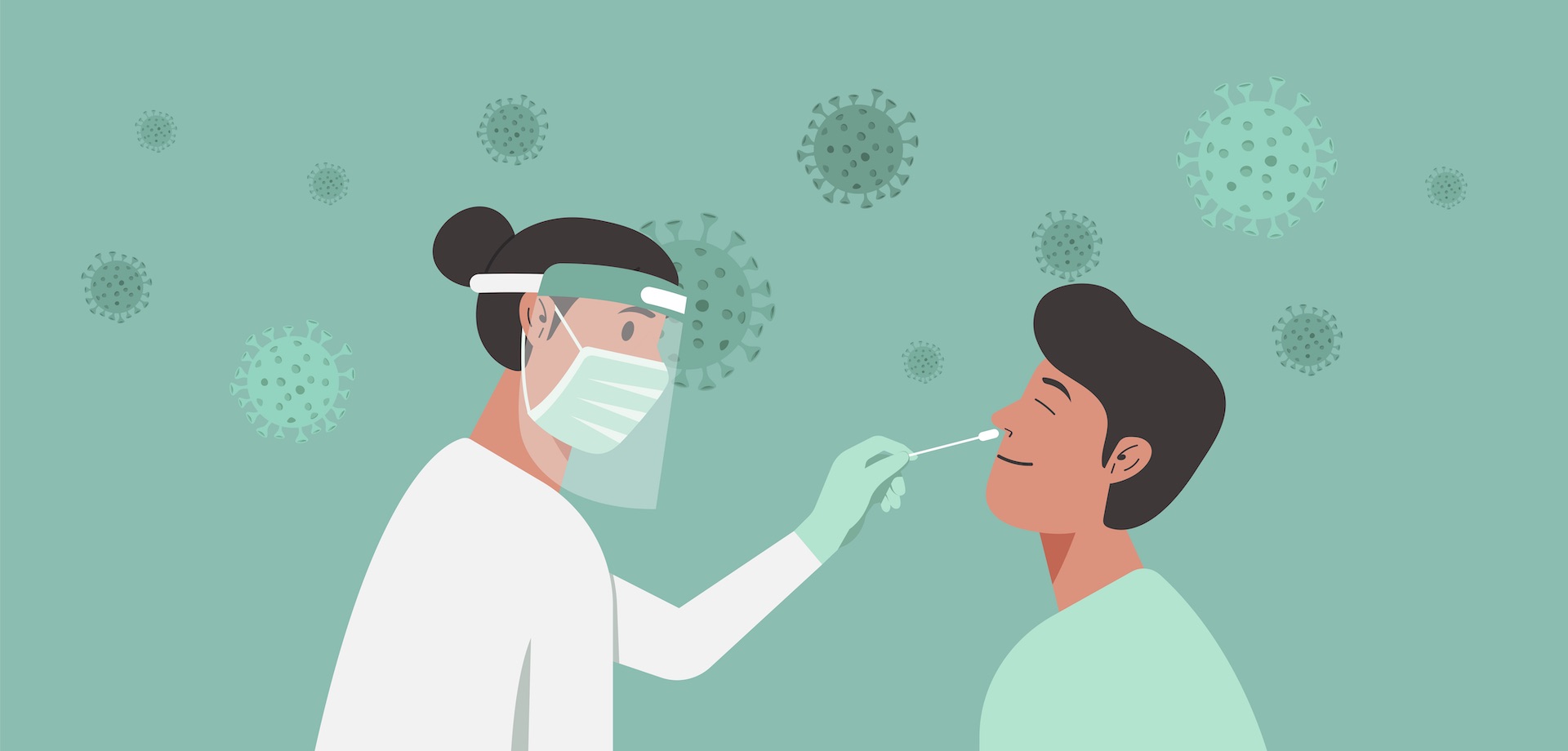
Latest Information On Covid-19 Testing
16th November 2020
We offer several tests for SARS-CoV2, the virus which causes Covid-19. We would always recommend discussing with a doctor to make sure you get the right test for your situation. We know lots of our patients want to understand more about the tests.
Covid-19 Rapid Antigen tests are the newest, hailed as the “Operation Moonshot” programme. When infected, SARS-CoV2 is detectable in the nose and throat. It is detectable in the week before symptoms and the following 5 to 7 days. After this most people will no longer test positive. Rapid antigen tests use a swab or saliva sample. This is then mixed with an extraction fluid. The fluid is then applied to a small cassette, a bit like a pregnancy test. The fluid moves across the cassette, hence the scientific name ‘lateral flow assay’. Viral antigens are part of the surface of the virus. If the fluid contains the ‘antigen’, it will attach to antibodies on the test and a line becomes visible.
In the clinic, we use rapid antigen swab tests manufactured by the Swiss company Roche. The tests give a result in 15 minutes. In laboratory testing, the test found over 96% of cases, called the sensitivity of the test. The tests gave a correct negative result over 99% of the time, called the specificity. We can expect that these figures will be lower in real-life use. Government trials in Liverpool showed lower pick-up rates with Innova rapid antigen tests. Rapid antigen tests by a healthcare professional may detect 70-80% of cases. In time we all hope rapid antigen tests will become better, cheaper and more available. At present, they are only licensed for use by healthcare professionals. The tests advantage is that we can get a quick result. They can add to our assessment for non-specific symptoms such as a sore throat, tummy upset or rash. A negative rapid antigen test does not mean you can stop isolating for a cough, fever or loss of sense of smell or taste. They also do not give any exemption from quarantining for travel or close contacts.
The gold standard test is the “PCR” test, short for polymerase chain reaction. Throat and nose swab samples treated with reagents, to make copies of the virus DNA in the laboratory. If the cut-off level of copies is there the test is “positive”. If you have a new cough, fever, or loss of sense of smell or taste your household must isolate. If you then get a negative PCR test you can usually then stop isolating. Many countries also need a negative PCR test for entry. Our laboratory PCR test reports sensitivity and specificity of over 98%. In real-world use we know PCR tests can miss 5-10% of infection or higher. The accuracy can depend on factors such as how and when the sample was taken.
We are continuing to learn about this virus and how best to test and find cases. Some scientists think rapid antigen tests may be more useful in the community. They may miss some cases but likely pick up those with a high “viral load”. Having a large amount of the virus or “load” is likely more infectious. We know the virus is detectable and spread before any symptoms appear. So there may be a role for regular screening with a quick and easy rapid antigen test. But there are downsides, false-positives may mean people have to isolate for instance. Some countries test all close contacts and many have broader criteria for testing. Covid-19 can be asymptomatic or cause fatigue, headaches, rashes, and tummy upsets. Rashes in particular may be the best predictor in children. We have to watch over time how test statistics change. The accuracy of tests is partly dependent on how common or rare the virus is in the population.
Antibody testing was hyped as a way back to normality. We currently offer the Abbott IgG antibody test in our clinics. This uses a normal blood sample, not a fingerprick, and is analysed by an external laboratory. The test measures IgG antibodies, usually made from around 14 days following infection. They are specific to the particular virus. The manufacturer tests showed antibody results to be over 99% accurate. In real-world testing, we know around 5% of people test negative despite having had Covid-19. This may be higher with weakened immune systems or when it has been longer since illness. We don’t know how well or how long antibody protection is. So currently protective measures such as masks and social distancing must continue regardless. In the clinic, we have found antibody testing helpful for some people. For instance, if they could not be swabbed at the time or have long-term symptoms.
Another part of the immune system called “T cells” can help stop or reduce Covid-19 infections. These cells can kill the virus or help recruit other parts of the immune system to fight the virus. Studies show SARS-Cov2 specific T cells persist over 6 months after infection. Another study showed higher rates of T cells against Covid-19 in Germany (80%) compared to the UK (50%). Currently checking for T cells is only available as part of research studies. Vitamin D can help T cells become more active and this may be one factor in how people respond to the virus. It adds weight to the benefits of making sure you have a healthy vitamin D level this winter.
Dr Lucy Hooper
References
BMJ 2020;371:m4268 [https://www.bmj.com/content/371/bmj.m4268]
BMJ 2020;371:m4257 [https://doi.org/10.1136/bmj.m4257]
BMJ 2020;370:m3563 [https://doi.org/10.1136/bmj.m3563]
https://bestpractice.bmj.com/topics/en-gb/3000201/pdf/3000201/Coronavirus%20disease%202019%20%28COVID-19%29.pdf
https://diagnostics.roche.com/global/en/products/params/sars-cov-2-rapid-antigen-test.html#productSpecs
https://www.who.int/emergencies/diseases/novel-coronavirus-2019
https://assets.publishing.service.gov.uk/government/uploads/system/uploads/attachment_data/file/890566/Evaluation_of_Abbott_SARS_CoV_2_IgG_PHE.pdf
https://www.tdlpathology.com/covid-19/
https://www.skinhealthinfo.org.uk/covid-symptom-study-app-and-british-association-of-dermatologists-launch-covid-skin-rash-gallery/
https://covidskinsigns.com/